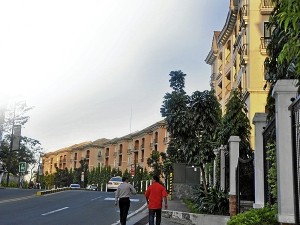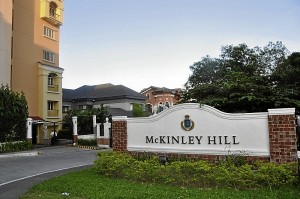
MCKINLEY Hill includes the upscale McKinley Hill Village, the panish-Mediterranean-inspired McKinley Garden Villas and the Stamford Executive Residences. Photo by Tessa R. Salazar
Based on property giant Megaworld’s experience in the ongoing Corona impeachment trial in the Senate, would it now be prudent for condominium and other property developers to screen their high-profile buyers, particularly those involved in politics, before closing the deal?
Property analysts think that could be a task next to impossible to implement, considering the stiff competition among property developers. Data they provide show that one condominium unit is now being sold every eight minutes.
Enrique Soriano, Ateneo program director for real estate and senior adviser for Wong+Bernstein Business Advisory, said that for Megaworld, from a market leadership position with thousands of residential units produced and sold every year, that wouldn’t make good business sense.
Tedious exercise
“It can also be a very difficult and tedious exercise to be selective and discriminating. Additionally, discretions on the selection process, if done incorrectly, can likewise lead to some form of ethical dilemma when choosing buyers,” Soriano explained further.
“A background check can go as far as the current and future financial capability of the buyer, or when there is a prior ‘red flag’ information about a particular buyer,” he added.
He said there is no law or provision he knows of that prohibits sellers of real estate to discriminate when choosing prospective buyers and investors.
“In my experience with other Asian countries, I likewise cannot recall specific restrictions on arbitrary selection of buyers. It’s a competitive marketplace out there and in practical terms, an average of one condo unit is sold every eight minutes in this country. Therefore, being selective can add up to additional logistical and operational burden for developers. Developers have stringent standards in qualifying buyers and for as long as they continue to embrace best practices and are aware of their legal accountabilities, they will be fine.”
He added, “It also pays to be publicly listed as periodic disclosures and rigid compliance rules form part of the company’s regulatory requirement.”
On the other hand, David T. Leechiu, country manager of Jones Lang LaSalle Leechiu, said there should be controls in place to protect both buyers and developers.
“I think screening the buyers may be hard to implement because there is so much new wealth being created in the Philippines, and therefore many first-time buyers. It will be hard to get a reliable system to check the background of buyers. It’s too early to draw conclusions since the courts are still judging the case,” he said.
Hot seat
Megaworld had been in the hot seat the past couple of weeks at the Senate impeachment court, as its top level officers were summoned to shed light on the 303-square-meter Bellagio unit purchased by Supreme Court Chief Justice Renato Corona in 2009 at a substantially reduced rate. The impeachment trial had, in a way, “exposed” many details of the Bellagio project and other Megaworld projects such as McKinley Hill at the Bonifacio Global City.
Leechiu predicted, however, that the whole affair would leave the developer with no lasting ill effects. “If at all, it is free advertising for Megaworld. The buyers in particular will see past this situation as Megaworld has built a reputation and brand that will carry them through this gracefully,” he added.
Indeed, as the Senate trial plods forward, public attention has now been redirected to the Chief Justice’s bank accounts and deposits. That controversial Bellagio property seems to have moved to the back of the public’s mind, for now.


